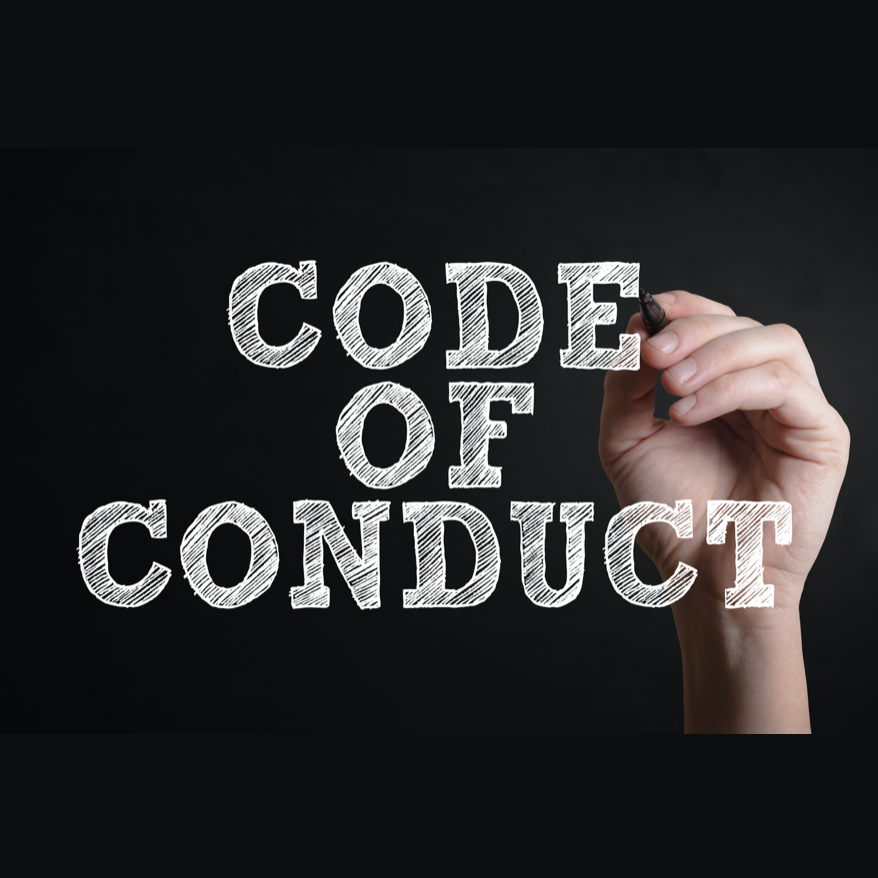The RIPE community has always aimed to foster an open, supportive atmosphere across its events and communication fora. The RIPE Code of Conduct helps make clear which behaviours cultivate that, and which don't. Here, the RIPE Code of Conduct Team talk about the work they do to help uphold RIPE community values.
In 2015, to help maintain a safe and open environment at RIPE Meetings, the RIPE NCC started publishing a Code of Conduct on its meeting pages reminding attendees to treat each other with tolerance and respect and providing a list of contact people trained to take action when bad behaviour was reported.
After some time, the need was expressed for a Code of Conduct built on community consensus that would apply across all channels of RIPE community engagement. A task force started gathering input with the goal of drafting an updated document.
In 2021, consensus was declared on the updated RIPE Code of Conduct (CoC) and, after further clarification of its processes and consequences, a team was assembled to investigate reported breaches of the CoC and to make sure that the outcomes of those investigations were properly applied.

Our numbers have since grown, and we've been active over the course of several RIPE meetings. That said, we wanted to give the community an update on our story so far - on how we work as a team, how our internal processes are decided, how we prepare for upcoming events, and what kinds of work we've actually encountered.
So, there is the CoC Team - what now?
The first vital step was training. While the CoC document outlines how the CoC Team is to be formed and gives a general outline of its duties, it deliberately does not specify in detail how exactly those duties are to be carried out. So, after the initial team was formed in April 2023, a couple of weeks before RIPE 86 in Rotterdam, we started getting instruction on how best to fulfil our new role.
We learned a lot of hands-on things very fast - some obvious, some not so much. Here is a non exhaustive list of things we needed to figure out:
- Record keeping
- Retention time
- Anonymisation
- Form of the transparency report
- How to form assessment groups
- How to ensure confidentiality
Beyond all this, while we continue to learn a lot from process adopted by other communities, we have to make sure whatever we establish fits the community we serve and support. That depends in no small part on understanding our community’s needs.
A new report comes in - what next?
If someone feels attacked by - or is made uncomfortable by - the behaviour of another RIPE community member at a RIPE meeting or on a mailing list, that person can approach any CoC Team member in person, over email, or via the web form (which can used to submit anonymous reports), to discuss the case and to create a “report”.
Once the team receives a new report we first need to decide if it actually falls under the CoC. While the document itself provides a solid baseline, the external training we received before RIPE 86 provided valuable guidance in judging if reports fall under the CoC. Reports the CoC Team does not follow up on include spam and incidents outside of the jurisdiction of the CoC - e.g., on media not officially part of the RIPE community.
For cases the team does take up, we form an assessment group who take care of the initial follow up. This usually involves inquiring with the reporter, collecting additional details, and agreeing on a course of action. Additionally, we talk to the other affected parties and keep a record of events. After that it depends on the actual case. The CoC gives the team a wide option of actions to deal with CoC infringement (more on this here). Until now, all cases which the team took up could be solved amicably in one form or the other.
What kind of reports has the CoC Team received so far?
All CoC reports are handled confidentially. As such, we can not divulge too many details of the cases we’ve dealt with so far. Yet, there is a justified community interest in understanding what CoC cases have come up since the formation of the team.
To this end, we provide a transparency report during the closing plenary of every RIPE meeting. This report is a high level overview of what happened during the meeting. We give the number of open and closed cases, broadly categorise the incidents, and report on the actions we took.
As of today, we have not received any reports regarding any sexually unwanted behaviour or assaults. The majority of cases were of the broad category of “bad or mis-communication” - e.g., someone feeling uncomfortable about how somebody else acted on the microphone or misunderstandings in discussions during socials. For details, please refer to the transparency reports: RIPE 86 and RIPE 87.
A timely response
In the past we were asked why we were not able to close all cases concerning a RIPE meeting by the end of the closing plenary. While we do our best to deal with all reports in a timely manner and bring them to a resolution. Due to the timing with which the reports tend to come in, this is simply not possible.
Consider a RIPE meeting where people arrive Sunday evening and leave around Friday afternoon. While the number of reports in general is low (~3-4 per meeting) most of them start coming in from Wednesday onwards, sometimes even only Friday morning. Even if something happens - let’s say - at a Monday social, it may take a person a day or two to report something they felt uncomfortable with.
So in order to ensure due diligence we need to follow up with the reporter and all affected parties. Ideally, we’ll speak to them in person. This requires a lot of coordination and, quite frankly, a lot of running around and sending a lot of mails back and forth.
Some of us need to leave early, some have obligations, sometimes even the reported parties are not reachable anymore during the meeting. Because of this we as a team have calls between physical RIPE meetings to follow up with action items and ensure all cases are being handled with the utmost care.
After the meeting we follow up with every open case and document our actions. There is still no fixed process how we as a team update the community and we are open for input on that question. We could (a) add such cases to the transparency report on the next RIPE meeting, or (b) send an update to the RIPE list in the same style.
Transparency report update since RIPE 87
During the closing plenary at RIPE 87 we reported two cases still open for investigation because they were reported too late to be dealt with during the meeting. Here's the recording of the RIPE 87 transparency report.
In both cases, we have formed assessment groups, talked with the reporting parties and team members were recused when a conflict of interest occurred. We discussed with the reporting parties and took further actions where necessary.
More specifically:
- One case was for an incident that did not constitute a violation of the RIPE Code of Conduct.
- The other case was resolved without any other action needed by the RIPE Code of Conduct Team.
After RIPE 87, the team got an inquiry regarding mailing list conduct and we are still looking into the issue.
Main lessons learned
Larger team means more flexibility
As of today the CoC Team consists of eight members. This sounds like a large number, but consider the fact that not everyone is able to attend every meeting or follow every mailing list. On top of that as a community we are all volunteers and many of us wear multiple hats within the RIPE community and work a day job. We have different travel schedules during and aside the meetings while living in different time zones. Sometimes we need to form assessment groups which are based on a subset of the team; either because one of us is involved in a case or may have a conflict of interest as described in RIPE Code of Conduct: Process and Consequences.
Considering all of the above a team of eight people doesn’t seem that large. As such, we are always looking for volunteers.
Logistics are hard and timeliness is of the essence
The most important aspect is to deal with all incoming reports in a timely and confidential manner. From this basic idea follow a bunch of very practical aspects of our work, especially during physical RIPE meetings.
To follow up with CoC requests you need to have private chats with people, that needs a room which must be available at all times without extensive arrangement procedures. The same room also doubles as the place for our daily status meeting. We figured out quite fast, that even on an eventless day having a daily sync to ensure everyone is on the same page, is essential. Once we figured that out, the meeting team was very accommodating and from RIPE 87 on we had a dedicated room at our disposal. Whenever we deal with a report we need to ensure that all involved parties are as comfortable. So if some team members have ever thrown you out of a “terminal room” - sorry, but not sorry.
Once a report comes in, we form an assessment group, a subset of the CoC Team who is from then on responsible for the report. Who is part of a specific assessment group depends on multiple factors - e.g., potential conflicts of interest or availability. Depending on the nature of the report we may need to consider factors like gender, but until now this was not necessary. We usually ask the reporting party for details and during a physical meeting we ask for an onsite meeting. Arranging that alone can take up to a full meeting day depending on mail reply times or if we are able to catch the reporting party on site. The same goes for arranging on site meetings with other involved parties.
Conclusions
Now that you have a better idea how the RIPE Code of Conduct Team works, we hope you have confidence in us as the CoC Team to handle the responsibilities we have been entrusted with.
Everyone's participation in the RIPE community should be a positive and productive experience. Maybe learning about our work ensures everyone is comfortable speaking up when you are faced with behaviours that are not beneficial to the overall community.
We are all part of the effort to build an open, safe and constructive community, for building and operating the best free and open Internet for all. If you have any feedback on our work do not hesitate to reach out to us at coc@ripe.net!


Comments 0
The comments section is closed for articles published more than a year ago. If you'd like to inform us of any issues, please contact us.